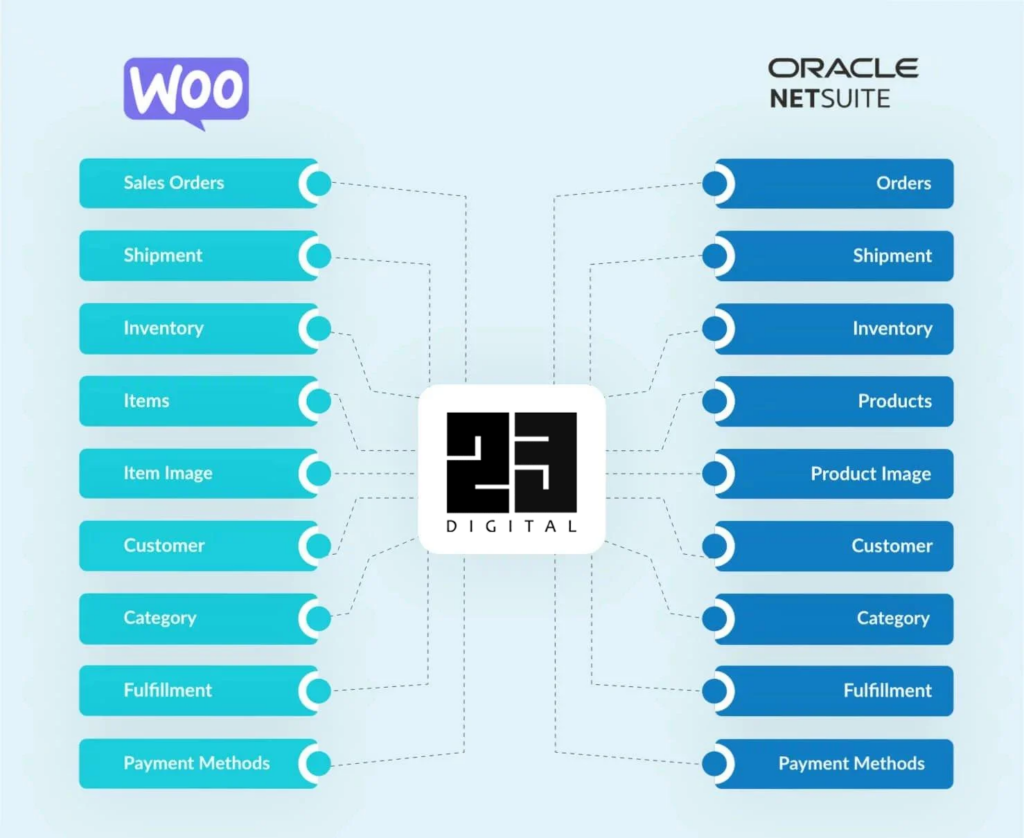In the dynamic world of eCommerce, maintaining an edge over competitors requires businesses to adopt advanced, robust solutions.
This necessitates seamless communication between different software systems that manage various aspects of the business.
As a leading cloud-based suite of ERP and accounting modules, NetSuite caters to an array of business needs.
On the flip side, WooCommerce, an open-source eCommerce platform, powers a significant portion of online stores worldwide.
The integration of these two powerhouses—WooCommerce to NetSuite—unlocks immense potential for businesses, significantly improving operational efficiency and customer experience.
This blog post delves into the whys and hows of this integration.
Why is WooCommerce to NetSuite Integration Essential?
To stay ahead in the eCommerce game, businesses must optimise their operational workflows and provide unparalleled customer experiences.
The WooCommerce to NetSuite integration plays a crucial role in achieving these goals.
Here’s why.
- Elimination of Manual Data Entry and Human Errors: Manually entering data into multiple systems is not only time-consuming but also increases the likelihood of errors. With the WooCommerce to NetSuite integration, businesses can automate data synchronization, minimizing errors, and freeing up valuable time.
- Real-time Business Visibility: An integrated system provides real-time insights into various business operations, such as sales, inventory, and customer data. This unified view enables businesses to swiftly adapt to market changes and customer needs.
- Enhanced Operational Efficiency: Automation of routine tasks and workflows through integration means less time spent on mundane activities. Consequently, businesses can focus more on strategic initiatives, driving growth and profitability.
Key Integration Points Between WooCommerce and NetSuite
To maximise the benefits of integration, it’s crucial to focus on some key integration points between WooCommerce and NetSuite:
- Customer Data Synchronisation: By syncing customer details from WooCommerce to NetSuite, businesses can keep their customer records current, opening avenues for targeted marketing and personalised customer experiences.
- Product Information: Automatic synchronisation of product information—including pricing, descriptions, images, and stock levels—from NetSuite to WooCommerce integration ensures accurate and up-to-date product details on the eCommerce store.
- Order and Invoice Processing: Whenever a customer places an order on WooCommerce, the order details can be automatically created in NetSuite. In return, the invoice generated in NetSuite is synced back to WooCommerce, thus streamlining order and invoice processing.
- Inventory Management: Real-time inventory updates from NetSuite to WooCommerce can prevent overselling situations, enhancing customer satisfaction. Simultaneously, inventory movement data from WooCommerce orders can update NetSuite, assisting in accurate stock forecasting.
- Shipping and Tracking Information: When an order is fulfilled in NetSuite, the shipping and tracking details can be automatically updated in WooCommerce. This transparent communication keeps customers informed about their order status, improving customer trust and loyalty.
How WooCommerce to NetSuite Integration Improves Customer Experience and Operational Efficiency
The integration of WooCommerce to NetSuite significantly enhances both the customer experience and operational efficiency:
- Real-Time Inventory Updates: With real-time inventory updates, customers can see accurate stock levels while shopping, reducing the likelihood of disappointments due to overselling.
- Speedy Order Fulfillment: Automatic order processing speeds up the fulfillment and delivery process, thereby enhancing the customer shopping experience.
- Data Accuracy: By minimising manual intervention, the accuracy of data improves, leading to better business decisions based on reliable data.
- Enhanced Customer Service: With integrated customer data, customer service reps can view complete customer histories, allowing them to offer personalised and efficient service, thereby improving customer satisfaction.
Timeframe and Costs for WooCommerce to NetSuite Integration
The timeframe and cost for integration largely depend on the complexity of the specific setup. A basic integration may take anywhere between 1 to 2 months, while a more complex one involving custom features or extensive data migration could take 6 months or more.
Cost-wise, a basic WooCommerce to NetSuite integration can range from $15,000 to $20,000. More intricate integrations could cost upwards of $50,000, covering planning, configuration, testing, and deployment. However, businesses should also consider recurring maintenance and upgrade costs.
Conclusion
In a nutshell, the WooCommerce to NetSuite integration holds the key to unlock the full potential of your eCommerce business.
While it requires an initial investment in terms of time and finances, the long-term benefits, including improved operational efficiency and enhanced customer experience, are immense.
With this integration, businesses can effectively streamline their processes, manage their data more accurately, and, in turn, drive significant growth.







